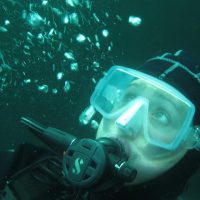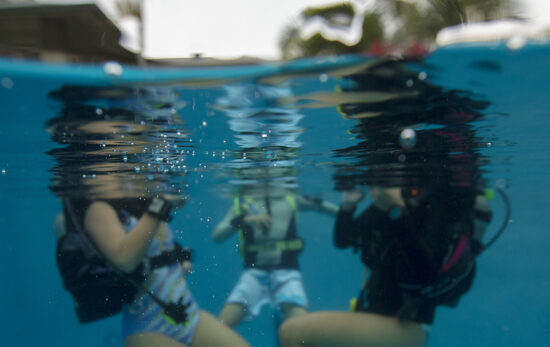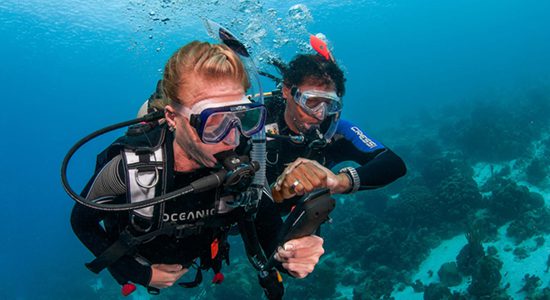Surface intervals are way too long sometimes! Between dives the next trip can’t come around fast enough, because you are drying out and so are your skills. By the time you are packing your dive bag, are you beginning to wonder if you still know what to do? Have you ever felt those pre-dive nerves after a break?
What can you do? No water in sight you just got to wait, right? Well, no! There is a surprising amount you can do. You’ll already know that you can revise your elearning and watch some videos to refresh your memory. That will be a useful as a reminder, but it is not the same as doing it. What you really want is practice. Did you know you can practice scuba diving when you are not in the water? And amazingly, it works to improve your scuba skills!

You can practice the basics by learning the skill of “mental rehearsal”
This is when you visualize or talk yourself through an action. For example: close your eyes, imagine a trickle of water running into your mask, visualize clearing it successfully the way you learned in training. If you do it right, there are two key advantages –
Firstly, you may get better at the skill. Studies have shown that sports people, athletes and scuba divers can perform skills better if they have used mental rehearsal as part of their practice routines. It is important that it is combined with real practice, so for best results make sure to add in some skills practice, coaching or ReActivate.
Secondly, it’s a helpful way to deal with pre-dive nerves. The research also shows that when divers use psychological skills anxiety is lower. Practicing through mental rehearsal certainly beats worrying and stressing.
It works because visualizing yourself doing the skill is like a dry run. Making movements is possible due to the connections that go from your brain, through nerves to muscles. These pathways let your mind tell your body how to move. Practicing a skill uses the connections, so they get stronger and the skill gets smoother. Even if you are just imagining yourself doing the skill in your mind, some of these connections are being made. Make sure you do it right.

Why haven’t I heard of this in diving before?
Although mental practice is common in sports and other activities, its less known about in scuba diving. You can find mental rehearsal in various courses, such as PADI Peak Performance Buoyancy, and distinctive courses like PADI Yoga Diver and PADI Psychological Diver.
Many recreational divers dive for fun and relaxation, and these performance enhancing skills might seem like something for competitive sports. This is a bit of a shame, because these meta-skills can of such benefit to divers who just want to enjoy being underwater.
Think about it: if you have practiced the skills, and can do them easily, then you really can relax on the dive as you know you’ll be ready to use the skill if it’s needed! It’s a move towards being a better (and calmer) diver.
So relax, go for a little dive in your mind, and improve your scuba skills.
Author Bio:
Dr Laura Walton is a Clinical Psychologist and PADI IDC Staff Instructor with a fascination for the psychology of diving. Visit scubapsyche to learn more about our behaviour as divers.





